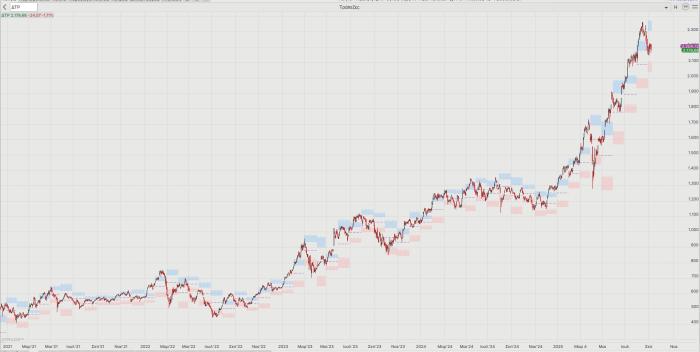The “honeymoon period” for banks and their stocks, fueled by the strong boost they received as a result of the country’s exit from the crisis and the return of the economy to normality, is now coming to an end.
Since the end of 2020, the banking index has risen by +325%, more than double the performance of the General Index over the same period (+151%). This outperformance intensified in the current year, as banks capitalized on the country’s strong recovery, the restoration of investment grade status, and the return of foreign investors to Greek banks.
This impressive rally fully closed the deep discount in the valuations of domestic banks, which for many years during the crisis and the era of extreme uncertainty traded at a price-to-book value (P/BV) of 0.50 or even lower.
It was a time when investors had lost significant amounts of money due to repeated recapitalizations, while for a long period they doubted the true capital adequacy of the banks, whether the sector could cope with the “mountain” of non-performing loans, and its ability to definitively overcome the deep crisis.
With the “Hercules” plan, banks were able to shed their non-performing loans, reshape their business models, and benefit from the economic recovery, gradually regaining market confidence.
Performance of the General Index and the Banking Index (2020–2025)
| Year | Banking Index | Change % | General Index | Change % |
|---|---|---|---|---|
| 2020 | 518.99 | – | 808.99 | – |
| 2021 | 574.93 | 9.7% | 893.34 | 9.4% |
| 2022 | 640.56 | 10.2% | 929.79 | 3.9% |
| 2023 | 1,061.62 | 39.7% | 1,293.14 | 28.1% |
| 2024 | 1,286.02 | 17.4% | 1,469.67 | 12.0% |
| Sept 10, 2025 | 2,205.61 | 41.7% | 2,031.61 | 27.7% |
Cumulative Return
- Banking Index: +325.0%
- General Index: +151.1%
Valuations at European Levels
Currently, the P/BV stands at 1.3 for National Bank of Greece, 1.2 for Eurobank, and close to 1 for Piraeus Bank and Alpha Bank — levels that in some cases approach or even exceed the valuations of European peers.
Beyond the normalization effect, banks also benefited from the strong economic recovery and the favorable interest rate environment, which drove a surge in profitability. This allowed them to overcome the thorny issue of deferred tax assets and, more importantly, to resume distributions to shareholders after 16 years of drought.
The Next Day
Despite the rally in bank stocks over the 2021–2025 five-year period, both Greek and foreign analysts remain optimistic about the sector’s prospects and potential, estimating that Greek bank shares still have significant upside potential.
However, they stress that future gains will no longer be driven by cheap valuations, but will instead depend on performance, profitability, dividend distributions, and moves in mergers and acquisitions that will strengthen business models and efficiency.
They also highlight that the upcoming upgrade of the Athens Stock Exchange is an important event that will provide a boost to valuations, but that the drivers stemming from the exit from the crisis and the return to normality are now largely exhausted.
From here on, they emphasize, the key drivers will be financial results, which are largely tied to the course of the economy, and business initiatives.
Analysts point out that the outlook for domestic banks remains strong through 2027, provided the economy stays on a positive trajectory, with expectations of robust profitability and attractive dividend yields.
It is telling that for the three-year period 2025–2027, the business plans of systemic banks project net new loan issuance — that is, new loans minus repayments of existing ones — of over €35 billion in total.
Moreover, banks have undertaken significant business moves that have substantially upgraded their positions and broadened their prospects.
- Eurobank completed the acquisition of Hellenic Bank in Cyprus, at an excellent valuation, significantly enhancing its international footprint while reducing its dependence on the Greek market.
- Piraeus Bank also proceeded with large-scale initiatives, the most recent and most important being the acquisition of National Insurance, which greatly expands its revenue sources.
- Alpha Bank undertook a series of moves, most notably its alliance with Italy’s UniCredit, which now holds 26% of Alpha. It has also pursued acquisitions (Cyprus, AXIA, etc.) and strategic partnerships such as with Hellenic Post (ELTA).
- National Bank of Greece also transformed its business model, investing heavily in technology. Its large capital surplus gives management the advantage of exploring alternative strategic options to further strengthen its position.










